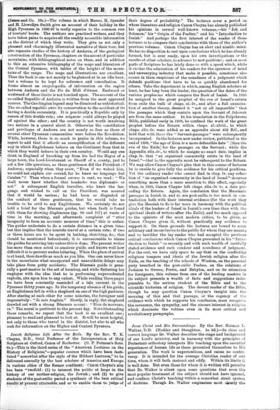Jewish Religious Life After the Haile. ' By the Rev.
T. K. Cheyne, D.D., Oriel Professor of- the - Interpretation of Holy Scripture at Oxford, Canon of Rochester. (G. P. Putnam' e Sons. 6s.)—This is the third series of the "American Lectures on the History of Religions,"—popular courses which have been insti- tuted " somewhat after the style of the Hibbert Lectures," to be delivered annually by the best scholars- of America and Europe in various cities of the former continent, Canon Cheyne's aim has been " twofold : (1) to interest the public at large in the history of our mother-religion, the Jewish; and (2) to give students of the post-exilic period a synthesis of the best critical results at present attainable, and so to enable-them-to- judge of their degree of probability." The lectures cover a period on whose literature and religion Canon Cheyne has already published his opinions in several well-known volumes,—his "Job and Solomon," his "Origin of the Psalter," and his "Introduction to Isaiah." And perhaps the first interest of the reader of these lectures is to compare their conclusions with those of the author's previous volumes. Canon Cheyne has an alert and nimble mind. He has no disposition to rest upon conclusions which he has already formed, but is ever ready, upon his own investigations or the results of other scholars, to advance to new positions ; and on ,most parts of Scripture he has lately done so with a speed which, while it excites the admiration of hie readers for the openness of mind and unwearying industry that make it possible, sometimes also rouses in them suspicions of the soundness of a judgment which defends positions that have to be so quickly abandoned for others. Take the department in which, among English scholars at least, he has long been the leader, the question of the dates of the various prophecies which compose the Book of Isaiah. In 1893 he assigned to the great prophet of the eve of Israel's return from exile the bulk of chaps. xl. -1v., and after a full examina- tion of another theory, deemed it "not at all impossible" that the passages which they contain upon the Servant of Jehovah are from the same author. In his translation in the Polychrome Bible, published early in 1898, he confined the work of the great prophet before the Return within chaps. xl.-xlvi.ii., to which chaps. xlix.-1v. were added as an appendix about 432 B.C., and held that with these the "Servant-passages "were subsequently incorporated. In the lectures now under review, published in the end of 1898, "the age of Ezra is a more defensible date" [than the eve of the Exile] for the passages on the Servant ; while the Appendix xlix.-1v., to which he assigns no exact date, implies in chap. lv. that "an organised community exists in the land of Israel,"—that is, the appendix must be subsequent to the Return. We may allow Canon Cheyne's plea that in this course of lectures he is unable to give fully the evidence for his critical positions. Yet the ordinary reader who cannot find in chap. Iv. any reflec- tion of "an organised community in the land of Israel" deserves something more than a. mere assertion to this effect, especially when, in 1895, Canon Cheyne left chaps. xlix.-1v. to a date pre- ceding the Return. Again, the conclusion that the Messianic passages in Isaiah ix. and xi. are post-exilic is too much in con- tradiction both with their internal evidence (for the work they give the Messiah to do is far more in harmony with the political ideals of the leaders of Israel in Isaiah's own time than with the spiritual ideals of writers after the Exile), and too much opposed to the opinions of the most modern critics, to be given, as Canon Cheyne gives it, without practically any evidence to support it. On these grounds the lectures are bound to seem arbitrary and inconclusive to the public for whom they are meant; and to bewilder the lay reader who had accepted the previous critical conclusions which Canon Cheyne presented in his "Intro- duction to Isaiah" so recently and with such wealth of Carefully stated evidence and such candour and soundness of judgment. For the rest, we have only space to- say that on the oonflictieg religions tempers and ideals of the Jewish religion after the Exile, on the teaching of the schools of Wisdom, on the personal piety breathed in the post-exilic Psalms, on the relations of Judaism to Greece, Persia, and Babylon, and on its attraction for foreigners, this volume from one of the leading masters in its -subject presents a wealth of facts and suggestions indis- pensable to the serious student of the Bible and to the scientific historian of religion. The. devout reader of the Bible, though he may question Canon Cheyne's insight into the meaning of this and that passage, or the cogency of the evidence with which he supports his conclusion, must recognise the reverence, the sympathy, and the sincere interest in religion which dominate the volume even in its most critical and reeolutionary paragraphs.






















































 Previous page
Previous page